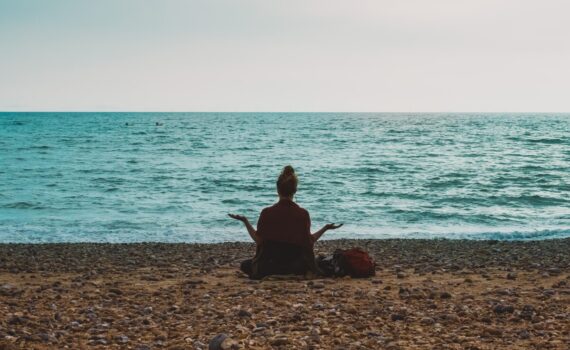Mindfulness and Public Health
Category : PROspective
Written by: Alex Whicker
This semester I decided to branch out from my usual Maternal and Child Health and Epi courses to take something a little different: Mindfulness and Public Health (BSHES 583 with Dr. Nilaja Green). While I mainly hoped it would be a fun class filled with meditation and interesting discussions (which it is) I’ve been pleasantly surprised to learn about how closely mindfulness ties into the realm of public health. Mindfulness, I’ve learned, is a tool that can be learned not only to improve my own life, but the lives of my friends, family, and the people I will serve in my public health career as well!
One important teaching in mindfulness is that all living things are connected. This reflects the public health tenet that our health is dependent on the health of the people and environment around us. Just as our individual wellbeing can be affected by a neighbor having the flu or our community suffering from smog, so can our thoughts and emotions be impacted by those around us. This is why it is smart to be intentional about who and what we surround ourselves with. Beyond that, however, it is also important to carefully consider the thoughts and feelings we allow to rule our minds, as they can impact others whether we realize it or not. Similar to how washing our hands is a moral decision to decrease the risk of disease for those around us, practicing mindfulness is an act which can improve the interactions we have with others.
One of the most obvious ways mindfulness has connections to public health is its effective use as a tool for dealing with chronic illnesses, pain, grief, and mental health. One way that mindfulness helps people deal with physical ailments is by teaching us that our minds and bodies are one and the same and reminding us to attend to our bodies beyond just dealing with pain. Mindfulness can help us connect with the present moment through physical cues, such as through breathing, so that we might become more aware of our bodies and emotions. Noticing the physical sensations we’re experiencing can help clue us into what feelings we may be ignoring. A tight chest, for example, may be an indication of stress and anxiety, while feeling hot or antsy could be a sign of frustration or anger. In addition to improving the relationship between our mind and body, mindfulness is often used in dialectical behavioral therapy to help patients balance opposing thoughts. One common example of this which many struggle with is accepting that we may not be the cause of all of our problems but we are still responsible for our lives.
Mindfulness is useful for more than just caring for the patient. As public health professionals, mindfulness can also improve our relationship with ourselves and others. Working in a field that often witnesses suffering and pain can take a toll. Learning how to cope with our own feelings of burnout or powerlessness can help fuel us to continue serving others and responding to larger systemic or societal problems. Mindfulness teaches us to cope with uncomfortable or unpleasant thoughts and situations instead of ignoring or avoiding them. In this way we can be more present and honest with others when we encounter these inevitable experiences in our work. Mindfulness can also help us in our careers so that we may better focus and reach our goals. Learning to ask ourselves “why?” when we set goals can both serve as a reminder of our purpose as well as clarify what our intentions are when we are striving to achieve something.
Mindfulness teaches us not to judge our own thoughts and feelings. This helps us reserve judgement for others as well, so that we may create connections rather than divisions. Throughout this semester I have learned that there are many ways to engage in mindfulness. Whether it be through meditation, yoga, an intentional walk, or simply choosing to ignore the instinct of reaching for your phone in an uncomfortable situation there are numerous opportunities for us to incorporate mindfulness into our lives. If you’re interested in starting your own mindfulness journey, check out this website. This article may also be a great place to learn more about the intersection of mindfulness and public health.
Featured Image by processingly on Unsplash
